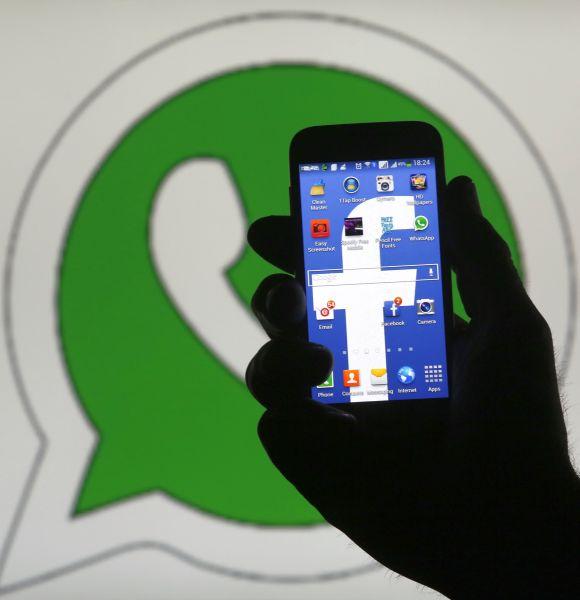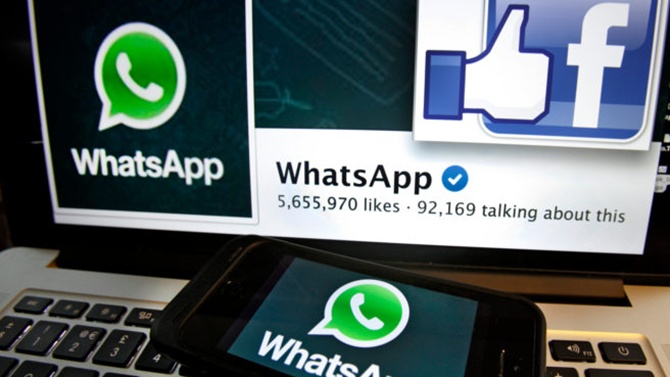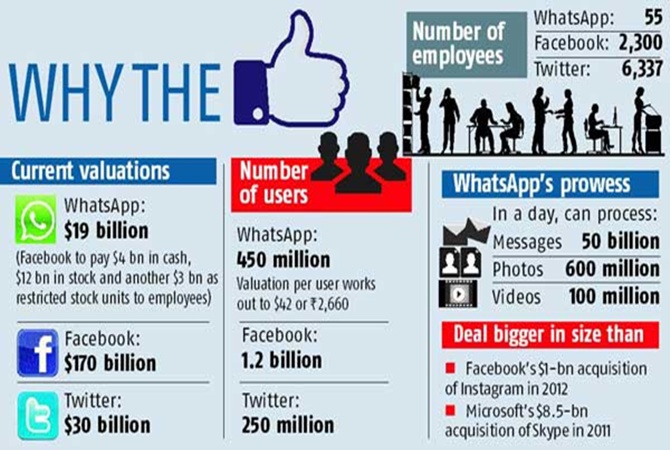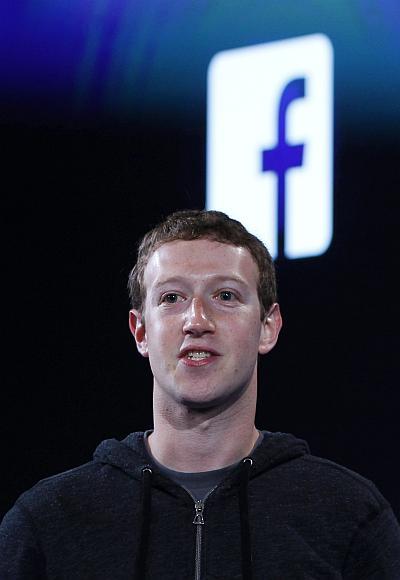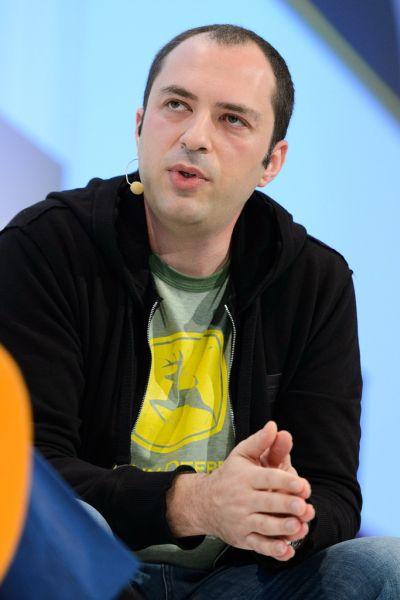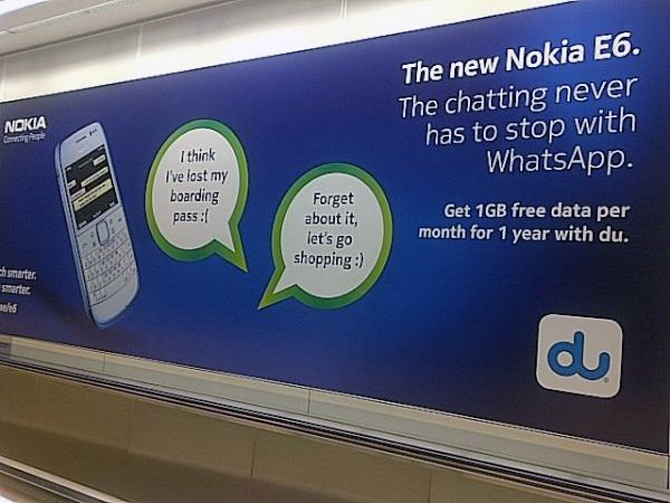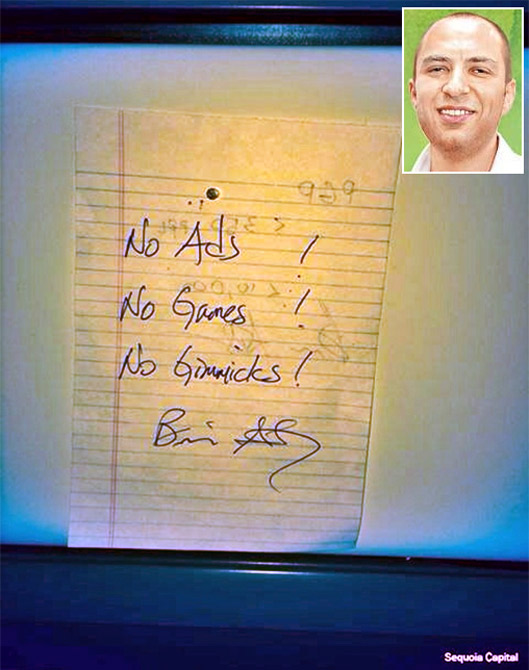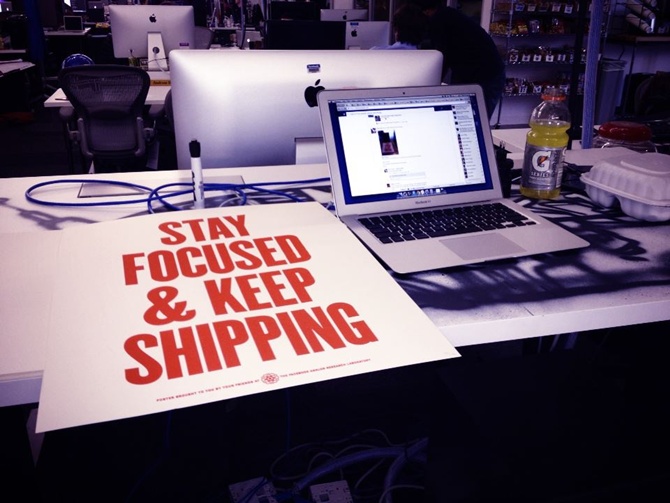 | « Back to article | Print this article |
Facebook likes WhatsApp: Will the deal work wonders?
For now, one can only speculate on what led Facebook to its decision, which seems to go well beyond the financials.
Akshita, 14, from Uttar Pradesh, is unaware that late on Wednesday night, she was valued at $42 (roughly Rs 2,615) by some dark suits in a fancy American boardroom.
The ninth standard student is too young to be on any social networking site but has WhatsApp on her mobilephone - the price of which would only be slightly higher than her perceived valuation by Facebook.
Click NEXT to read more…
Facebook likes WhatsApp: Will the deal work wonders?
To expand reach among users on mobile devices (around 40 million like Akshita in India and 450 mn globally), the world's largest social network, Facebook Inc, said it was acquiring WhatsApp Inc, the mobile messaging start-up, for a staggering $19 billion in cash and stock.
The purchase would be the biggest Internet deal since Time Warner's $124-bn merger with AOL in 2001, according to data compiled by Bloomberg. The accord comprises $12 bn in stock, $4 bn in cash and $3 bn in restricted shares.
Click NEXT to read more…
Facebook likes WhatsApp: Will the deal work wonders?
WhatsApp is adding a million users daily and targeting a billion members in the near future.
Facebook is justifying the steep price by arguing it will help the 10-year-old social networking site generate more growth from younger users who are slipping away from it.
It will also help the site cement its presence on mobile, the perceived platform of the future, a feat it has been struggling to achieve.
Click NEXT to read more…
Facebook likes WhatsApp: Will the deal work wonders?
India Impact
Experts say the deal will help Facebook strengthen its hold in India, where it already has around 100 mn users. In this country, an equal number of people access the Internet through personal computers and mobiles.
Almost every new internet user being added is also coming online through the mobile phone. Though WhatsApp has not disclosed the number who access the service in India, this is estimated at 30-40 mn.
In India, bandwidth is a huge issue and the user interface for Facebook is not optimal on mobile phones, as accessing all its features are very difficult, said Vidya S Nath, director, digital media, Global Innovation Center, Frost & Sullivan.
Click NEXT to read more…
Facebook likes WhatsApp: Will the deal work wonders?
On the other hand, "WhatsApp is easy, simple and clutter-free" for consumers, who are increasingly using it for not only messaging but sharing lots of media, such as photographs, videos and news.
The country has 900 mn mobile users, of which 70 mn have smart phones. Nielsen Informate Mobile Insights (Nima) says close to 90 per cent of smartphone users use a chat app. Usage of such apps among smartphone users has significantly risen, from 70 per cent in November 2012 to 86 per cent in November 2013, says Nima.
With the might of Facebook added to WhatsApp, competing messaging services such as Chinese WeChat and Japanese Line, gaining ground and closing on WhatsApp globally and in India, could feel the heat.
Click NEXT to read more…
Facebook likes WhatsApp: Will the deal work wonders?
Wider issues
Anubhav Nayyar, country manager, India, of call-and-messaging app provider Viber, said such acquisitions hint that the industry of instant messaging and calling is gaining scope in the internet space.
"But it is difficult to say if such a trend will continue and whether we will see more of such acquisitions happening…It all depends on individual business models."
Facebook has been trying into tap into the mobile phenomenon by launching applications such as Facebook m Messenger and services through which it can be accessed on low-cost handsets even without an Internet plan; however, without resounding success.
It is this gap it aims to fill through acquiring WhatsApp.
Vishal Tripathi, principal research analyst, Gartner, said the intention was probably to swallow WhatsApp before it became too big. "The payment is so huge because Facebook has not only paid for the company and the product but also the large user base, growing by the day."
Click NEXT to read more...
Facebook likes WhatsApp: Will the deal work wonders?
Ahead
The deal has left analysts across the world flabbergasted. While some justify the staggering amount by saying mobile is the future of Facebook, others warn against building a dot-com bubble all over again.
Promoters of both companies also did not say how WhatsApp would make money beyond a $1 annual fee, not charged for the first year.
For now, WhatsApp will continue to remain independent and advertising-free. However, experts also warn of some integration in the future, which could upset loyal users of WhatsApp who seek more private and intense communications.
Click NEXT to read more...
Facebook likes WhatsApp: Will the deal work wonders?
Analysts also say Facebook's tendency to buy services it can't fight or replicate (it recently bought photo sharing application Instagram) perhaps smacks of a loss of innovation at the company, which broke new ground in the tech sector not so long ago.
Nath added a word of caution: "What FB has not bargained for is that it could tread into the unknown waters of regulation and possible action."
Currently, WhatsApp's discrete growth in connecting consumers on data networks has not been fully scrutinised and screened by several regulatory bodies internationally, she said.
"With FB's eye-popping acquisition, this could bring WhatsApp into the spotlight."
